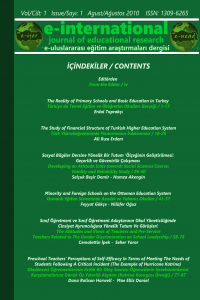Teachers' Mental Associations about the Covid-19: An Example of Metaphor Study / Öğretmenlerin Covid-19 Salgınına İlişkin Zihinsel Çağrışımları: Bir Metafor Çalışması Örneği
Covid-19, Eğitim, Metaforik algı, Öğretmen
Teachers' Mental Associations about the Covid-19: An Example of Metaphor Study / Öğretmenlerin Covid-19 Salgınına İlişkin Zihinsel Çağrışımları: Bir Metafor Çalışması Örneği
Covid-19, Education, Metaphorical Perception, Teacher.,
___
- Arı, A. G., & Arslan, K. (2020). Covid-19 Perception in Middle School Student' Mind. Electronic Turkish Studies, 15(6).
- Arslan, M. M. (2006). Examination of Metaphoric Thinking and Learning Approach in Terms of Education [Metaforik Düşünme ve Öğrenme Yaklaşımının Eğitim-Öğretim Açısından İncelenmesi]. Üç Aylık Eğitim ve Sosyal Bilimler Dergisi, 171, 100-106.
- Aykaç, N., & Çelik, Ö. (2014). Comparison of Methaphoric Perception of Teachers and Pre-service Teachers About Curriculum. Education and Science, 39(173).
- Bozkurt, A. (2020). Images and Perceptions of Primary School Students towards Distance Education during Coronavirus (Covid-19) Pandemic: A Metaphor Analysis. Usak University Journal of Educational Research, 6(2), 1-23.
- Cantürk, G., & Cantürk, A. (2021). İngilizce Öğretmenlerinin Covid-19 Küresel Salgını Sürecinde Gerçekleştirdikleri Uzaktan Eğitim Deneyimleriyle İlgili Görüşlerinin Metaforlar Yoluyla Belirlenmesi. International Journal of Current Approaches in Language, Education and Social Sciences, 3(1), 688-724.
- Cömert, İ., & Çakır Şahin, Ç. (2021). Covid-19 ile ilgili Öğretmen Algılarını Belirlemeye Yönelik Bir Olgu Bilim Çalışması. Academia Eğitim Araştırmaları Dergisi, 6(2), 382-405.
- Creswell, J. W., & Poth, C. N. (2016). Qualitative Inquiry and Research Design: Choosing Among Five Approaches: Sage publications.
- Çokyaman, M., & Menderes, Ü. (2021). Öğrenci ve Öğretmenlerin Covid-19 Salgını Dönemindeki Uzaktan Eğitim Algısı: Bir Metafor Analizi. OPUS Uluslararası Toplum Araştırmaları Dergisi, 18 (Yönetim ve Organizasyon Özel Sayısı), 1684-1715.
- Demirbaş, N. K., & Koçak, S. S. (2020). Evaluation of the Covid-19 Pandemic Period from the Perspective of Parents with Children between the Ages of 2-6. Eurasian Journal of Researches in Social and Economics, 7(6), 328-349.
- Demirbilek, N. (2021). Metaphoric perceptions of university students on distance education / Üniversite öğrencilerinin uzaktan öğretime İlişkin metaforik algıları. E-International Journal of Educational Research / e-Uluslararası Eğitim Araştırmaları Dergisi, 12 (1), 1-15. DOI: https://doi.org/10.19160/ijer.786303
- Demirtaş, H., & Çoban, D. (2014). Metaphors of University Students on University and Faculty Concepts (İnönü University Example) [Üniversite Öğrencilerinin, Üniversite ve Fakülte Kavramlarına İlişkin Metaforları (İnönü Üniversitesi Örneği)]. OMU Journal of Education Faculty, 33(1), 113-144.
- Ercan, E. S., Rodopman Arman, A., İnal Emiroğlu, N., Behice Öztop, D., & Yalçın, Ö. (2020). Psychosocial and Mental Support Guide for Family, Children and Adolescents during the Covid-19 Virus Outbreak [Covid-19 (Korona) Virüs Salgını Sırasında Aile, Çocuk ve Ergenlere Yönelik Psikososyal ve Ruhsal Destek Rehberi].
- Ertürk, R. (2017). Metaphoric Perceptions of Primary School Students on the Concept of "Teacher" [İlkokul Öğrencilerinin “Öğretmen” Kavramına İlişkin Metaforik Algıları]. E-Uluslararası Eğitim Araştırmaları Dergisi, 8(3), 1-15.
- Genç, M. F., & Gümrükçüoğlu, S. (2020). The Views of Theology Faculty Students on Distance Education in the Coronavirus (Covid-19) Process. Electronic Turkish Studies, 15(4).
- James, P. (2002). Ideas in Practice: Fostering Metaphoric Thinking. Journal of Developmental Education, 25(3), 26.
- Karcıoğlu Ö. (2020). Coronavirüs Nedir, Nasıl Korunabiliriz?. Anka Tıp Dergisi. 2(1): 66-71.
- Kavuk, E., & Demirtaş, H. (2021). Difficulties Experienced by Teachers in the Distance Education During COVID-19 Pandemic / COVID-19 Pandemisi Sürecinde Öğretmenlerin Uzaktan Eğitimde Yaşadığı Zorluklar. E-International Journal of Pedandragogy / E-Uluslararası Pedandragoji Dergisi 1(1), 55–73. https://trdoi.org/10.27579808/e-ijpa.20
- Koçoğlu, E., & Kaya, F. (2016). Metaphorical Realization of the 8th Graders about Exam Concept in Turkey. Electronic Turkish Studies, 11(19).
- Levine, P. M. (2005). Metaphors and images of classrooms. Kappa Delta Pi Record, 41(4), 172-175.
- Miles, M. B., & Huberman, A. M. (1994). Qualitative data analysis: An expanded sourcebook. sage.
- Patton, M. Q. (1980). Qualitative Evaluation Methods.
- Saatçi, G., & Aksu, M. (2020). A Study on the Detection of Coronavirus Perceptions of Foreign Students Receiving Tourism Education at the Undergraduate Level through Metaphor. Journal of Awareness, 5(4), 617-630.
- Saban, A. (2008). Metaphors about School. Educational Administration: Theory and Practice, 55(55), 459-496.
- Saban, A. (2009). Prospective Teachers’ Mental Images about the Concept of Student. The Journal of Turkish Educational Sciences, 7 (2) , 281-326 .
- Sarı, T., & Nayır, F. (2020). Education in the Pandemic Period: Challenges and Opportunities. Electronic Turkish Studies, 15(4).
- Sarıer, Y., & Uysal, Ş. (2021). Öğretmen Adaylarının Covid-19 Pandemi Sürecindeki “Öğretmen” ve “Öğrenci” Kavramlarına İlişkin Metaforik Algıları. Uluslararası Sosyal Bilimler Akademi Dergisi., 5, 606-642.
- Semerci, Ç. (2007). A View to The New Primary School Curricula With The Metaphors Relating to "Curriculum Development". Journal of Social Sciences, 31(2).
- Team, R. C. (2020). R: A language and environment for statistical computing (Version v.3.6.3). Vienna, Austria: R Foundation for Statistical Computing. Retrieved from https://www.R-project.org/
- Telli Danışmaz, A. (2020). The Effect of Covid-19 Epidemic to Consumers’ Online Shopping Behavior. Social Sciences Research Journal, 9(2), 83-90.
- Toprakçı, M. S., Hepsöğütlü, Z.B., & Toprakçı, E. (2021). The perceptions of students related to the sources of problems in distance education during the covid-19 epidemic (example of İzmir Atatürk High School) / Covid-19 salgini sürecinde öğrencilerin uzaktan öğretimde sorun kaynaği algilari (İzmir Atatürk Lisesi örneği). E-International Journal of Pedandragogy / E-Uluslararası Pedandragoji Dergisi, 1(2), 41–61. https://trdoi.org/10.27579808/e-ijpa.40
- World Health Organization. (2020). Coronavirus disease 2019 ( COVID-19): situation report, 94.
- Yavuz, B., & Toprakçı, E. (2021). The Opinions Shared in Internet Forums about Schools’ Distance Education Due to Covıd-19 Pandemic / Covid-19 pandemisi sebebiyle okullarin uzaktan öğretim yapmasi ile ilgili internet forumlarinda paylaşilan görüşler. Karaelmas Eğitim Bilimleri Dergisi / Karaelmas Journal of Educational Sciences 9 (2021) 120-139. Retrieved from https://dergipark.org.tr/tr/pub/kebd/issue/63030/913518
- Yayın Aralığı: Yılda 2 Sayı
- Başlangıç: 2010
- Yayıncı: Erdal TOPRAKCI
Erol KOÇOĞLU, Mesut AYDIN, Ayşegül DUMLUPINAR ARSLAN, Nursenem ÇETİNKAYA, Revanur KUBAT, Nimet KARABULUT
Mustafa KORHAN, Esin ENGİN, Berna GÜLOĞLU
Meltem ÖZDEMİR, Mehmet Tahir KARABOĞA
Didem KAYAHAN YÜKSEL, Esma EMMİOGLU
Etem YEŞİLYURT, Ümran OKUDAN, Burak KIZILASLAN
Osman BİRGİN, Fatma Nur ÖZTÜRK
Cemal YURTSEVEN, Tuğba HOŞGÖRÜR
Ortaokul Öğrencileri Arasında Siber Zorbalık / Cyber Bullying Among Secondary School Students
